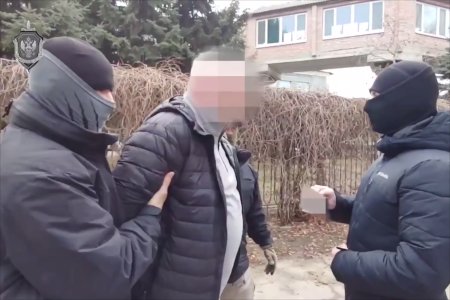
A court in Russia has passed a horrific 25-year sentence against Serhiy Karmazin, a 46-year-old Ukrainian originally from Kharkiv oblast, who was seized by the FSB on 15 February 2023, and accused of an act of rail sabotage. There are multiple grounds for concern about this case, in which the only ‘evidence’ would appear to be from a ‘confession’ extracted while Karmazin was held incommunicado and while the FSB even flouted a court order to prevent Karamzin seeing an independent lawyer.
Virtually all of the information about Karmazin’s imprisonment and ‘trial’ came from the Russian Solidarity Zone human rights initiative, and it was they who reported the sentence on 30 April, citing a letter written by Karmazin to one of their readers.Karmazin wrote that he had been sentenced to 25 years, with the first 6 years in a prison (the worst of Russia’s penal institutions) followed by 19 years in a harsh regime penal colony. A massive 700 thousand rouble fine had also been imposed.
There had been information on the website of the Second Western District Military Court, but from this it was clear only that a sentence had been handed down on 28 March, and that an appeal against it has been lodged. Considering the nature of the charges against Karamzin, and the massive sentence passed, it is disturbing that the website states that the trial was before a single judge, Maksym Viacheslavovich Maksymenko. Solidarity Zone reported that Maksymenko presided over a panel of three, which would be more standard.
Karmazin (b. 1977) was seized on 15 February 2023 in Moscow, with the FSB accusing him of having set fire to two railway signal boxes in Moscow region and claiming that he had done this on instructions from Ukraine’s Security Service [SBU] and the security services of both Poland and Latvia. SBU has dismissed this allegation, and says that Karamzin himself is on their list as one of Russia’s many Ukrainian prisoners of war or civilian hostages.
Karmazin was initially accused only of sabotage (under Article 281 § 2a of Russia’s criminal code). The huge escalation in the number and gravity of the charges against him came while he was held incommunicado and prevented from seeing independent lawyer Dmitry Sotnikov. The final indictment accused the Ukrainian of ‘spying’ (under Article 276); of ‘training in sabotage activities’ (Article 281.2); planning and preparing explosive devices (Article 30 § 1, Article 223.1 § 3); participation in a saboteur group (Article 281.3 § 2); participation in a terrorist group (Article 205.4 § 2); planning an act of terrorism (Article 30 § 1, Article 205 § 2); and ‘training in terrorist activities’ (Article 205.3).
As mentioned, the only ‘proof’ presented came from the FSB’s press release together with a supposed videoed ‘confession’. On this, a person whose face is blurred asserts that he earlier lived in Kharkiv oblast, but had gone to Poland in November 2022 ‘to earn money’. No attempt was made to explain why Karmazin would have expected to get to Poland during wartime when men were not allowed across the border without compelling grounds. The FSB, instead, claimed that Karmazin had been “recruited”, and not only by Ukraine’s SBU, but by the Polish Security Service. The FSB clearly decided that ‘working for two countries’ was not enough and had Karmazin say that he then went to Latvia where local enforcement officers also subjected him to a lie detector and got involved in this surreal ‘recruitment’. From there he went to Moscow to organize Russian citizenship, and to carry out the alleged sabotage. A standard feature of such ‘confessions’, which numerous Ukrainian political prisoners have, as soon as they get access to a real lawyer, retracted as given under torture, is that the person invariably claims some kind of financial motive, blackmail, etc. In this case, the ‘confession’ includes the assertion that the Polish and Ukrainian security services threatened physical reprisals against his daughter who was living in Vinnytsia, if he did not carry out their demands.
Dmitry Sotnikov, a lawyer who previously defended Ukrainian political prisoner Oleksandr Kostenko, tried repeatedly to see Karamzin in the Lefortovo SIZO [remand prison] in Moscow but was prevented from doing so. He lodged an appeal and even succeeded in receiving a court order that Karmazin be brought to the court to express his wishes. Despite this, on 1 July 2023, Karamzin was not allowed to be present. Instead, ‘FSB investigator’ A.V. Kovtun presented a statement, allegedly written by Karamzin rejecting Sotnikov’s representation and instead agreeing to be represented by a state-appointed ‘lawyer’. According to Sotnikov, this individual, Natalia Beklich had, at best, been totally passive and had not even tried to appeal against Karamzin’s detention.
Such methods have long been used by the FSB in occupied Crimea to prevent Ukrainian political prisoners having access to independent lawyers, and not those there to simply sign documents and encourage the imprisoned Ukrainians to admit to whatever charges are laid. There is every reason to believe that any such rejection was obtained under duress by Kovtun, who had repeatedly prevented Sotnikov from seeing his client. Solidarity Zone reported that Sotnikov had lodged a complaint with the UN Working Group on Arbitrary Detention.
Although there have been some cases in Russia of railway partisans seeking to stop Russia’s war effort, like the many courageous Belarusian partisans, the alleged damage to signal boxes in the Moscow region Podolsk area does not appear to fall into that category. In February 2024, the independent Russian publication ‘Vot Tak’ reported that such attacks on signal boxes happen fairly often. “However among the dozens of other saboteurs, only Karmazin is accused of working for other countries’ intelligence and of eight criminal charges, although it is extremely rare for suspected saboteurs to face more than one [charge].”
Judging by the information that the publication did uncover, it seems unlikely that Karmazin was targeted for any particular political reasons, unless one calls his Ukrainian nationality ‘political’. It certainly looks as though his nationality was the reason for quite grandiose charges and claims that the security services of three countries were involved in an alleged act of vandalism in Moscow region.



